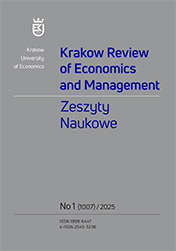Generation Z’s Approach to Searching
for and Performing Work
Generation Z’s Approach to Searching
for and Performing Work
Author(s): Dariusz Nowak, Emil Nikolov , Joanna WiśniewskaSubject(s): Human Resources in Economy, Socio-Economic Research
Published by: Wydawnictwo Uniwersytetu Ekonomicznego w Krakowie
Keywords: Generation X; Y; Z; attitude to work; lifestyle; behaviour; expectations;
Summary/Abstract: Objective: The main purpose of the article is to identify the most significant factors influencingGeneration Z’s approach to work. The priorities that guide individuals of this generation inlooking for and performing work were established and then assessed.Research Design & Methods: The paper conducts a critical review of the literature beforepresenting quantitative research. The basis for the empirical research was a two-part questionnaire.The first one was a data sheet used to characterise the sample, while the second contained closedquestions that respondents rated on a 5-point Likert scale. The collected empirical materialwas coded and converted into numerical data for detailed analyses of the population. The scaleenabled us to determine the strength and direction of the impact of each variable. Due to themultidimensional and multifaceted nature of the problem, factor analysis procedures were used.The decisive factor for choosing this procedure was the individualised and subjective nature ofmost responses. Calculations were done with Statistica StatSoft 13.3, using descriptive statistics, correlations, and multivariate analyses. The survey was conducted in late 2022 and early 2023 ona sample of 428 representatives of Generation Z.Findings: The results showed that Generation Z’s approach to work is pragmatic andconfrontational. In their search for and performance of a job, they consider standard factorssuch as: salary adequate to the commitment and the position, various employee benefits, and therelationship and atmosphere in the workplace. At the same time, they strive for independence,prefer flexible working hours, seek understanding, forbearance and empathy and, above all, lackof exploitation and being overloaded with tasks.Implications / Recommendations: Demographic changes in today’s world have forced companiesto change their employment policies. In many cases, the methods have not met expectations,which has been a factor in the widening employment gap. Our research could help entrepreneursunderstand Generation Z and fashion job offers that are attractive to Gen Z as it enters the labourmarket. They should also help Gen Z navigate the labour market, particularly regarding employerexpectations and conditions.Contribution: The results of the study are a voice in the discussion on the behaviour, expectations,approach and commitment of Generation Z in the labour market. The factors confirm otherresearch and underscore the dynamic changes this generation is exhibiting as it carves out itsplace in socio-economic life.
Journal: Zeszyty Naukowe Uniwersytetu Ekonomicznego w Krakowie
- Issue Year: 1007/2025
- Issue No: 1
- Page Range: 171-188
- Page Count: 18
- Language: English

